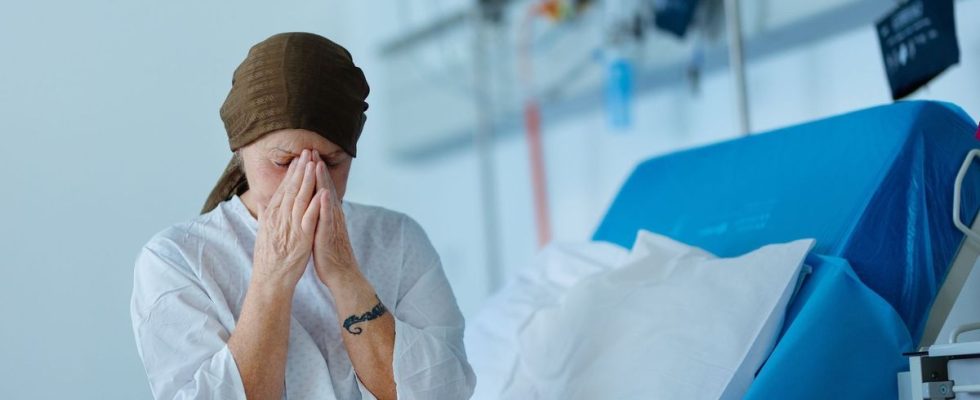Published on
Updated
Reading 3 min.
in collaboration with
Ivan Pourmir (medical oncologist)
In Texas, a mother endured aggressive chemotherapy and said goodbye to her family, condemned by her doctor. This was not the case, the cancer analyzed was ultimately not one. Can such a diagnostic error occur in France? Oncologist Ivan Pourmir answers us.
Lisa Monk lived through a nightmare of which she will carry the traces for a long time. This 39-year-old Texan mother was diagnosed with a rare terminal cancer after a mass on her spleen was detected. After several months of treatment and a very pessimistic prognosis, she learned that her cancer was simply not cancer.
He is told 15 months to live in the best case scenario.
Lisa’s ordeal begins with a CT scan, originally intended to detect a kidney stone. But a mass appears on her spleen, a mass that is removed in January 2023 and which is sent for analysis in several laboratories, according to what the patient says. One of them returns his verdict: Lisa Monk has an aggressive form of blood vessel cancer called clear cell angiosarcoma.
“I was in shock. The diagnosis was horrible and [ils] They told me it was terminal.”
From then on, difficult events followed one another: she was told 15 months to live in the best case scenario, and the urgency of undergoing aggressive chemotherapy, which she began in March. Upset, Lisa faces the consequences of her shock treatment: vomiting, hair loss, raw skin… While contemplating the end with her family.
No cancer detected during further checks
It was then that during his second series of chemotherapy, everything changed: according to the hospital’s policy, new pathological tests were carried out on site based on the file initially transmitted. The feedback is clear: there is no cancer. The mass was linked to unusual blood vessel activity, without consequences. Naturally his treatment is stopped. But Lisa discovers that the report dates from a month earlier and doesn’t let up.
“I would have avoided the second round of chemotherapy if they had bothered to read their own pathology report.”
A year later, if Lisa Monk fully appreciates the fact of now having time with her family, she nevertheless remains marked for life by this ordeal, the physical and emotional after-effects of this emergency treatment. To make matters worse, she is still pursuing reimbursement for her useless treatment, which is not covered in her country.
Mother endured ‘aggressive’ chemotherapy and said goodbye to her family after being given just 15 months to live – only to discover she NEVER had cancer https://t.co/qB6AiY4g4m Lisa Monk, from College Station in Texas, was told she had terminal cancer Read More: Alarm over myst…
— tv2club (@tv2club) April 9, 2024
In France, the decision for treatment is highly regulated
Could this terrible error happen to us in France? We questioned Dr. Ivan Pourmir, oncologist and member of our expert committee, about how chemotherapy or any other cancer treatment is decided. This takes us through a route in several stages which limits the risk.
“In France, to decide on the treatment of a patient, their case and diagnosis must first be discussed in a multidisciplinary consultation meeting (RCP) in which several doctors from different specialties must sit. With rare exceptions, the decision always requires histological proof, that is to say a tumor sample and not simply an image or a clinical sign. biopsy, or based on the surgically removed tumor. These tissues must then be analyzed by a pathologist, specialized in microscopic diagnostics on tissue samples. It’s on the basis of what this specialist finds that we make a decision.”
The process is even more advanced in cases of rare cancer. “If there is the slightest ambiguity (is it cancerous or not? What type of cancer is it?) a committee of several pathologists takes place. Only after all this can the RCP validate the diagnosis and treatment.”
Faced with cancer, however, no process can guarantee 100% resolution of complicated cases; this approach, however, minimizes the risk of initiating treatment for no reason.
